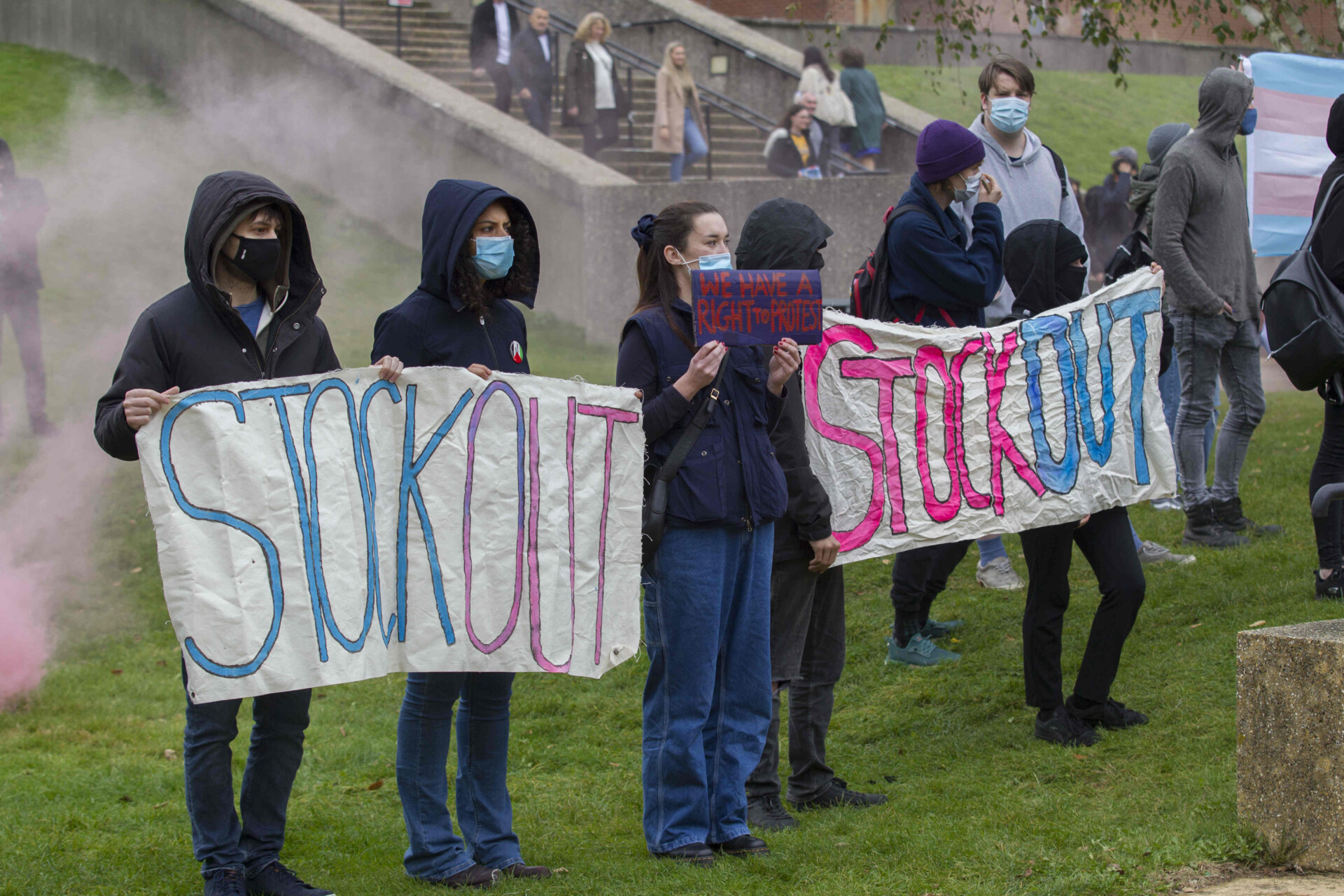‘I’m mostly out of the gender wars now. I certainly did my time in the trenches.’ (Credit: Greg Blatchford/CLICK NEWS AND MEDIA.)

Wheels of justice grind slow but grind big fine, as Sun Tzu once almost said. The Office for Students has now completed its three-and-a-half year investigation into free speech violations at Sussex University, hitting my former employer with a record penalty of £585,000. The fact that this is apparently only half of the sum first mentioned by the university regulator doesn’t seem to have cheered the Vice Chancellor up much.
“The… so-called investigation into the University I represent was flawed and politically motivated,” a furious Professor Sasha Roseneil wrote for Politics Home, shortly after the findings of academic freedom director Arif Ahmed were leaked to the Financial Times. Her experience of the investigation had been “Kafkaesque”, she said, and the “implications for the higher education sector could be dire”.
As it happens, I have some experience of Kafkaesque investigations at Sussex myself, so I can sympathise with Roseneil’s frustration. Under prolonged official scrutiny at various points for what I felt sure were fairly innocuous statements about sex and gender, I too felt a bit like Josef K at times. But the OFS’s investigation did not concern such stressful moments for me directly, nor did it deal with the equally surreal period of campus protests and harassment — posters and banners saying “Fire Stock”, manifestos in buildings telling people to “get angry” — before my resignation in 2021. Focusing instead on regulatory matters, its main conclusions relate to the university’s former “Trans and Non-Binary Policy”. As far as I am concerned, the findings are very welcome; I hope the sector finally pays proper attention.

In 2018, when this policy document was first published, something like it was mandatory for any organisation that wished to climb Stonewall’s then sought-after workplace rankings. The more radical you were prepared to be in eliminating traces of biological sex from your organisation, the better your chances of getting a virtual gong. Among other things, such policies were supposed to cover what bathrooms and changing facilities trans-identified people were entitled to use (typically, almost any of them); and what words would be tolerated about trans-identified people in classrooms (typically, a heavily restricted set). Many such policies were adapted from inherited templates, presumably originating with Stonewall, with the same clauses reappearing on university websites time and again. In my view, Sussex’s particular version set the tone for nearly everything that would then happen to me over the next few years, emboldening those at the university who were already against me, and enfeebling the morale of the rest.
The most egregious bit of the Sussex policy, in my eyes, was a clause which required that “any materials within relevant courses and modules will positively represent trans people and trans lives”. This seemed to me more like an instruction from a client to an advertising agency than a serious pedagogical commitment. Certainly, nothing like it existed for any other protected group, either at the time or since. This clause made it practically impossible to discuss with students what I saw as the severe detriments of defining “woman” in terms of inner feelings of gender identity, not biological sex: cases such as the trans-identified male prisoner Karen White, sexually assaulting female fellow prisoners in 2018, while “her penis was erect and sticking out of her trousers”, as was reported in a court trial shortly afterwards.
I tried to raise the matter with superiors but to no avail. Once, in a fraught meeting with a member of the senior management team, I was asked with some anxiety if my focus on male sexual assault statistics in relation to single-sex facilities implied I actually wanted to represent trans people negatively. Staggered at the stupidly Manichean terms being offered, I protested it did not, but did not feel believed. Over time, my teaching about sex and gender in feminist philosophy grew increasingly cautious, and most of my criticism of the sudden sanctification of gender identity took place elsewhere.
Still, in other ways I tried hard to raise the alarm to colleagues about the effects of trans policies on free expression, long before large fines on offending institutions were ever in the offing. I published letters in national newspapers, and gathered anonymous testimonies from colleagues across the country about how, in practice, academic freedom on sex and gender was being chilled. For a while, I was possibly the UK’s leading expert/biggest pub bore on the subject, collating a huge list of the most ludicrous clauses in university trans policies, circulating them to journalists, and writing about them in the press myself.
There was UCL’s policy, for instance, still online as I write this, which effectively turns lecturers into deferential intellectual lackeys, insisting that “If a trans person informs a staff member that a word or phrasing is inappropriate or offensive, then that staff member should take their word for it, and adjust their phraseology accordingly”. Or how about the University of Leeds’ version, also still up, which amalgamates two of the clauses found in breach at Sussex: “The University will strive to ensure that its curriculum does not rely on or reinforce stereotypical assumptions about trans people and that it contains material that positively represents trans people and trans lives.”

Academics who supported the introduction of these policies liked to pretend they only outlawed the truly “bad” sort of speech — you know, where bigoted, transphobic things were really being said — and not innocently meant or harmless statements. But how anyone was supposed to know the difference remained unclear; and especially not where Stonewall had taken the HR reins and was decreeing that “transphobia” now included “denying” someone’s gender identity “or refusing to accept it”. I have written or spoken variations upon that last sentence literally hundreds of times in the last five years, and so have lots of other people. I can’t tell you how bored I am of making such remedial points, obvious to anyone not educated into this level of stupidity. Yet many of these dim-witted, claustrophobic policies are still in place in universities across the land, right now.
Sussex, on the other hand, changed its policy to something more sensible a while ago, shortly after I left. The original one was published under then Vice Chancellor, Adam Tickell. Despite occasionally showing some awareness of problems caused by the old text’s wording, he seemed powerless to deal with them. Eventually, Tickell left to lead Birmingham University in 2021, just as I resigned. For this reason, I have been surprised by Roseneil’s combative response to the OFS judgement. I would have thought there was an opportunity here to regretfully concede past mistakes on someone else’s watch, then move on.
But in any case, I am afraid it is wishful thinking on her part to say of my time at Sussex that “the University has never wavered from its position… that her academic freedom and freedom of speech should be protected”; nor that “it has consistently and publicly defended her right to pursue her academic work and express her lawful beliefs”. Prior to her arrival in 2022, in my recollection there was indeed some wavering, not to mention rather patchy public defending. It would seem to me risky and expensive to hash out this evident difference of opinion in the glare of a high court legal challenge, but then again, what do I know: I’m just a former lecturer now, thank God.
Aside from her complaints about process, Roseneil also argues that the OFS’s ruling now makes it “virtually impossible for universities to prevent abuse, harassment or bullying, to protect groups subject to harmful propaganda, or to determine that stereotyped assumptions should not be relied upon in the university curriculum”. Leaving aside the daft idea that “stereotyped assumptions” can never be true — just think of the stereotypes about academics, for a start — I also think this complaint isn’t right. All university managers need to do is stop defining concepts such as “abuse”, “harassment”, or indeed “harmful propaganda” absurdly loosely, in order to pander to rapidly expanding notions of student victimhood and the crazed demands of moronic campaigners. This is not cold fusion or Fermat’s Last Theorem.
In any case, while I’ll never back down on saying sex matters more than gender identity, I’m mostly out of the gender wars now. I certainly did my time in the trenches. And I also gladly renounce the title “Professor”; I’m a former professor at most. In truth, no academic title means much to me anymore, such is my disgust for my former profession. Really, I’m a civilian now, with nobody looking over my shoulder. “He will win who knows when to fight and when not to fight”, is another Sun Tzu aphorism. And I really hope my former employer gets the hint.









